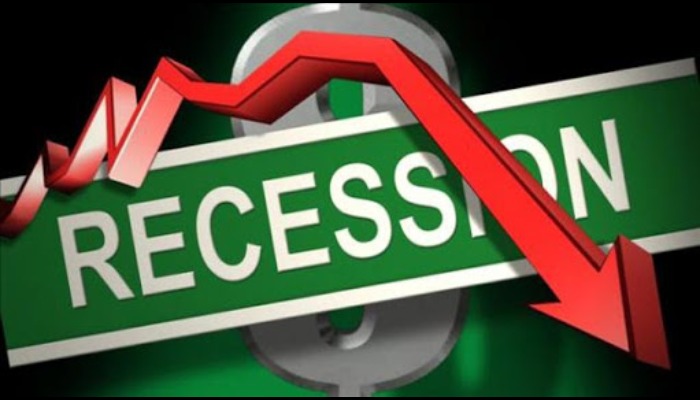It is always bad news for a national economy – recession, that is. It tends to roll back gains made in the management of the economy. We, the analogue generation under threat of annihilation by the digital yahoo-yahoo generation, would remember when recession first hit us in 1982. We did not know how it happened but we soon came to know that a nation that depends on one foreign exchange earner sits on the edge of the precipice.
The late president Shehu Shagari had ignored Chief Obafemi Awolowo’s warning a year earlier that the recession was about to hit our shores. The chief was a bearer of bad news; and this being a piece of bad news intended perhaps to spoil the champagne parties, he received the cane across the back. He was proved right.
- APC crisis: Oshiomhole’s sacked NWC members risk expulsion as NEC meets
- Buhari greets ex-Plateau military gov Atukum at 80
The recession arrived. Shagari suddenly found that he had taken the wealth of the nation and the health of our economy for granted. He could hear their hollow ring. He found himself tasked with actually managing, not wealth, but poverty even as the good times rolled on rather giddily. The reality that Nigeria was not really an oil-rich nation but an oil-dependent nation was a nightmare in broad daylight. Shagari imposed his famous or infamous – depends on which side of the fence you are sitting – austerity measures to pull the country back from the precipice.
Nothing has actually been the same since in the management of our national economy. The recession was held against Shagari as a fine example of what Brigadier-General Sani Abacha said Shagari had done to the economy – grossly mismanaged it. It was not entirely the president’s fault. There was a global oil glut at the time. The crude oil market is a buyer’s market. The buyer fixes the price. When the buyer chooses to buy less, there is glut, leading to a disastrous price crash. Many a national treasury instantly becomes empty.
Crude oil, very aptly named, is still crudely upsetting our national economic applecart. Every ruler since Shagari, the generals, that is, has had to grapple with an economy hostile to measured management. We either have too much money or too little money. An economy that operates at such extremes is a rogue economy and one that often defies the classical model of economic management.
Crude oil is not the problem. The problem is that as a nation, we have refused to pause, check the sources of our national wealth and determine our developmental and other goals consistent with the resources outside our near total dependence on crude oil – an easier option in our economic management that actually means earning and spending. The diversification of the economy was once a national mantra. We mouthed the mantra and we danced on the same spot. In coming home to roost, chickens tend to walk rather slowly; but they arrive at inconvenient times.
All our leaders, past and present, had refused to admit that the nation does not have wealth to manage. With 100 million extremely people, it is risqué to think that our problem is not wealth but how to spend money. The idea that a president is presiding over the management of poverty in a nation this endowed with human and natural resources, is difficult to sink in. The choice of managing wealth in the midst of crippling poverty is thus forced on our leaders in order to keep up the fiction that although our country wears the gold necklace of poverty capital of the world, we refuse to accept the challenges of managing less, not more.
And so, here we go. Nigeria slipped into recession in 2016, about one year after President Buhari took up residence in Aso Rock and began to call the shots. We quaked, fearing that we were about to spend endless hours in queues at super markets, waiting to buy essential commodities – rice, milk semovita, the essencos of Shagari’s austerity measures. It did not happen. Buhari chose to manage the recession in a manner that did not make life brutish for the people. That ill wind blew out to the Atlantic in its own time. We thought we would not see recession again so soon. If it was a prayer, I am sorry to say it was not answered. Perhaps the pastors did not shout holy ghost fire loudly enough.
Recession is here again. This time, we can blame the Covid-19 pandemic that has ravaged all national economies wholly or partly for it. The good thing is that our economic managers are not in a panic mood over it. The minister of finance, budget and planning, Zainab Ahmed, has predicted the recession would be all too brief; it would walk through the country and be gone in the first quarter of 2021. Still, recession by nature compels caution in public spending in order to chain inflation and lessen the struggle to get out of it.
So far, the federal government has taken no such cost-cutting measures to force all of us to become mini managers faced with personal challenges of living in and surviving the recession. Austerity measures are painful. Just to show that there is nothing to worry about, the executive council of the federation last week approved N40 billion for road construction and to fix ecological problems in some parts of the country. No one is afraid of recession, see?
It seems to me that this feel-good indulgence on the part of the government in the midst of the recession ignores signs that speak a different language. Let us not downplay what the recession portends for our fragile economy. The World Bank said that the recession is the worst in 36 years. Think about that. The Naira is unsteady on its feet. It exchanges at N620 to the British sterling and N483 to the US dollar. The federal government is to take a fresh loan of $750 million from the World Bank. Our total public debt is put at N31 trillion. We spend more on debt servicing than on capital projects: N2.46 trillion to N2.14 trillion this year. We operate a deficit budget. The 2021 budget would be funded with N6 trillion loan. The world has no record of a borrower-nation transforming into a great nation. Debt trap and the debt burden prevent such a leap.
Time to pause, rethink the feel good indulgence and face the realities of our situation. We are not a rich nation, never mind the growing tribe of billionaires. Our economy is fragile and volatile. Our population is growing at an annual rate of 2.6 per cent. Every new mouth tasks the nation with being able to feed it. The World Bank predicted that by the year 2030, 30 million more Nigerians would become extremely poor and our country would be home to 25% of the world’s extremely poor. That grim future is in our hands. Our only option is to come down from our high horse of a fabled rich nation and commit to managing our poverty in a manner that takes us out of poverty.




